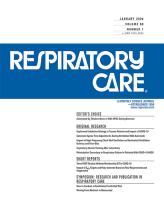This article requires a subscription to view the full text. If you have a subscription you may use the login form below to view the article. Access to this article can also be purchased.
From safe breath delivery to patient-ventilator synchrony, advancement in the understanding and application of mechanical ventilation over the past decades has improved care while increasing the complexity of mechanistic and algorithmic software-hardware interactions that complicate provider mode choice and setting at the bedside. The evolution from limited control variables (volume control and pressure control) and breath sequence (continuous mandatory ventilation, intermittent mandatory ventilation, continuous spontaneous ventilation) selection to alternative and complex ventilator mode targeting schemes has placed clinicians in a position that may require decision-making with incomplete information, trust in “black box” processes, and unrealistic expectation of mode algorithm design knowledge. Recently, guidance has been published to better understand the operational differences between each of the plethora modes available on the market.1,2 However, knowledge gaps remain in the detailed engineering of some modes and the bedside clinician's understanding of operation.
In this issue of Respiratory Care, Garnero and Chatburn3 examine a unique apnea time algorithm that automatically adjusts according to three specific variables rather than an absolute set time interval. The introduction of such operational algorithms follows an unfortunate historical precedent by ventilator manufacturers to superficially explain what a ventilator operation is designed to do. However, in far too many instances, there is very little transparency with regard to how the mechanical operation actually takes place. Garnero and Chatburn's efforts in describing this unique closed-loop function offer insight as to how bedside clinicians should interrogate and integrate all …
Correspondence: William M LeTourneau MA RRT RRT-ACCS, 200 First Street SW, Rochester, Minnesota 55905. E-mail: letourneau.william{at}mayo.edu
Pay Per Article - You may access this article (from the computer you are currently using) for 1 day for US$30.00
Regain Access - You can regain access to a recent Pay per Article purchase if your access period has not yet expired.







